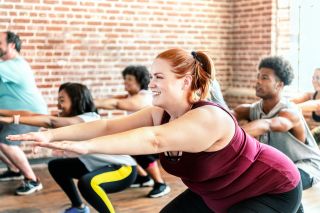Leave It Like a Squat: Squat Exercises Can Boost Attention

Inattentiveness is common in adults, and the longer we have to be “at work,” the more likely we are to wander (or fall asleep) in class or during a meeting.
Source: Stock / Shutterstock
People are easily irritated or confused.
When we have to be “at work” or pay attention for a long time, it can be easy for us to start dreaming. No matter how strong your public speaking skills are, whether it’s teaching in the classroom or leading a meeting at work, it’s likely that at some point you’ve looked around for room to find at least one person with eyes glazed over from staring at the sky, asleep. shameless!), or searching their phones or tablets.
How can you keep your audience engaged throughout the day at school, at a speech, or at a business meeting?

Breaks that include exercises like squats, lunges, or jumping jacks can improve concentration and happiness.
Source: Rawpixel / Shutterstock
Two words: Exercise breaks. Studies have shown that short physical activity breaks improve children’s behavior in the classroom and increase happiness, and data also suggest positive effects on academic performance. cognitive and academic (Daly-Smith et al., 2018; Kubesch et al., 2009; Vazou & Smiley-Oyen, 2014). Well-controlled laboratory studies in adults have shown positive effects of vigorous exercise on attention and memory (Chang et al., 2012; Loprinzi et al., 2018). But can exercise breaks help adults maintain focus in a “real world” environment? Can exercise breaks be good for adults?
To answer this question, I conducted a study of incorporating exercise breaks into several undergraduate and graduate psychology courses at Ohio State University (Hayes, 2024). This method was inspired by a laboratory study done well by Fenesi et al. (2018) that showed positive effects of practice breaks on attention and evaluation performance for videotaped lectures (compared to study as usual or video game play breaks).
How did we practice during lectures?
- Students were assigned to groups.
- Each group did a 5-minute workout.
- The students chose the music to play during the practice break.
- For each class, a group of students led the whole class during a practice break during the lesson.
Were people suffering from having to exercise during class?
No! The results were very good. Students reported that exercise breaks improved their attention span and allowed them to focus during class. They also rated exercise break time as enjoyable and improved peer relationships (Hayes, 2024).
Although this was a feasibility study, it showed that students tolerate practice breaks and find them enjoyable and beneficial. Indeed, they showed a strong preference for other classes to use practice breaks during lectures.
How can rest help me?
If you are a trainer or leader who regularly holds meetings longer than 30 minutes and you notice that attention has decreased among the attendees, it may be worth considering the implementation of short practice breaks . Of course, you will need a planned and practical approach that plans to include a wide range of mobility skills. My study provides practical guidance and tips for implementing exercise breaks, as well as sample exercise routines for breaks.
If you find yourself in a meeting, class, or at work and having trouble concentrating or doing the work you’re doing, it may be a good sign that it’s time to take a break. Sure, you can start doing jumping jacks, lunges, and burpees in the middle of your work session or classroom. However, you may prefer to use a more subtle approach.
Here are some tips for incorporating exercise breaks into the day. For example, during meetings or classes, sit in the back (back of the room, end of row) where you can take a break from sedentary behavior by standing up and doing low-impact movement. like taking a few steps around the room, calf. raise, or stretch out the hand to exchange the body. These are very small exercise gaps compared to some of the research mentioned above, but there is evidence that even light exercise can positively affect attention and memory. The important point is that the combination of sedentary behavior (sitting) and long hours in work such as listening to a lecture or meeting leads to a decrease in attention and an increase in mind wandering. Exercise breaks are another way to hit the reset button and refocus.
#Leave #Squat #Squat #Exercises #Boost #Attention